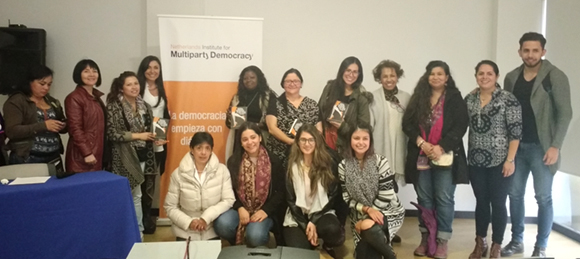Colombia: Exploring media, stereotypes and women’s political leadership

NIMD held a forum on the media, stereotypes and women’s political leadership on 10 May in Bogotá, Colombia. The event explored the stereotypes and obstacles that hamper gender equality and women’s access to political leadership positions.
With a focus on the Colombia context, the participants were invited to contemplate how the way women and men are portrayed in the media can compound these barriers and greatly affect the way we perceive gender roles.
Through the event, representatives of the gender offices of Colombia’s political parties, women candidates and party members were provided with tools for political Communications and social media management. These new skills will help to strengthen their leadership within their party, in the eyes of the electorate and in the general public opinion. Other participants included youth and minority political party representatives, Congresswomen and their advisors.
Special guest at the forum were international expert on political communications and gender, Virginia García Beaudoux. Virginia is a CONICET-IIGG researcher in Argentina; consultant with NIMD and the United Nations Development Program (UNDP); and Director at COMMUNICATIO communication strategies consultants. She is the author of ten books, including NIMD’s most recent publication Dancing Backwards in High Heels, and a communication advisor for politicians, candidates and governments. In the last few years, she has specialized in communication, leadership and the strategic development of political careers for female leaders, female politicians and female candidates.
The forum was organized in the framework of the UNDP-NIMD-IDEA Respect for Women Political Rights programme (WPR Programme) in Colombia. This programme aims to:
- provide technical assistance to political parties and their gender offices to promote more inclusive structures;
- strengthen political leadership among women representatives and candidates by providing spaces to improve their skills in communication, negotiation and political empowerment;
- facilitate multiparty dialogue on the political participation of women in Colombia and analyse the barrier to women’s leadership.